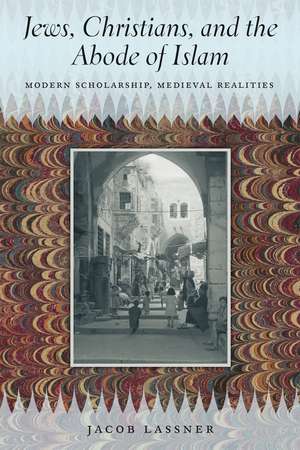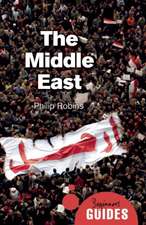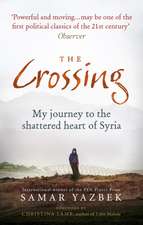Jews, Christians, and the Abode of Islam: Modern Scholarship, Medieval Realities
Autor Jacob Lassneren Limba Engleză Paperback – 4 feb 2014
In Jews, Christians, and the Abode of Islam, Jacob Lassner examines the triangular relationship that during the Middle Ages defined—and continues to define today—the political and cultural interaction among the three Abrahamic faiths. Lassner looks closely at the debates occasioned by modern Western scholarship on Islam to throw new light on the social and political status of medieval Jews and Christians in various Islamic lands from the seventh to the thirteenth century. Utilizing a vast array of primary sources, Lassner balances the rhetoric of literary and legal texts from the Middle Ages with other, newly discovered medieval sources that describe life as it was actually lived among the three faith communities. Lassner shows just what medieval Muslims meant when they spoke of tolerance, and how that abstract concept played out at different times and places in the real world of Christian and Jewish communities under Islamic rule. Finally, he considers what a more informed picture of the relationship among the Abrahamic faiths in the medieval Islamic world might mean for modern scholarship on medieval Islamic civilization and, not the least, for the highly contentious global environment of today.
Preț: 341.80 lei
Nou
Puncte Express: 513
Preț estimativ în valută:
65.41€ • 67.57$ • 54.44£
65.41€ • 67.57$ • 54.44£
Carte tipărită la comandă
Livrare economică 25 martie-08 aprilie
Preluare comenzi: 021 569.72.76
Specificații
ISBN-13: 9780226143187
ISBN-10: 022614318X
Pagini: 330
Dimensiuni: 152 x 229 x 20 mm
Greutate: 0.45 kg
Editura: University of Chicago Press
Colecția University of Chicago Press
ISBN-10: 022614318X
Pagini: 330
Dimensiuni: 152 x 229 x 20 mm
Greutate: 0.45 kg
Editura: University of Chicago Press
Colecția University of Chicago Press
Notă biografică
Jacob Lassner is the Phillip M. and Ethel Klutznick Professor Emeritus of Jewish Civilization and professor of history and religion at Northwestern University. His numerous works include The Middle East Remembered, Jews and Muslims in the Arab World, and Islam in the Middle Ages.
Cuprins
Preface
Acknowledgments
A Preliminary Note
Part One
Encountering the “Other”
Western Scholarship and the Foundations of Islamic Civilization
1
Orientalists
The Modern Quest for Muhammadand the Origins of Islamic Civilization
2
Rethinking Islamic Origins
3
“Occidentalists”
Engaging the Western “Other,” Medieval Perceptions, and Modern Realities
4
The Occidentalist Response to Modern Western Scholarship
Part Two
Jews and Christians
The Reality of Being the “Other” in the Medieval Islamic World
5
The First Encounter
Muhammad and the Jews of Arabia
6
Perceiving the “Other”
Jews and Muslims in the Abode of Islam
7
Accommodating “Others”
Tolerance and Coercion in Medieval Islam
8
Medieval Jewry in the Orbit of Islam
9
Early Muslim-Christian Encounters
The Islamization of Christian Space
10
Muslims and Christians
Perceptions, Polemics, and Apologetics
11
Christians, Muslims, and Jews
Cross-Pollinations in Medieval Philosophy and Science
Selected Bibliography
Index
Acknowledgments
A Preliminary Note
Part One
Encountering the “Other”
Western Scholarship and the Foundations of Islamic Civilization
1
Orientalists
The Modern Quest for Muhammadand the Origins of Islamic Civilization
2
Rethinking Islamic Origins
3
“Occidentalists”
Engaging the Western “Other,” Medieval Perceptions, and Modern Realities
4
The Occidentalist Response to Modern Western Scholarship
Part Two
Jews and Christians
The Reality of Being the “Other” in the Medieval Islamic World
5
The First Encounter
Muhammad and the Jews of Arabia
6
Perceiving the “Other”
Jews and Muslims in the Abode of Islam
7
Accommodating “Others”
Tolerance and Coercion in Medieval Islam
8
Medieval Jewry in the Orbit of Islam
9
Early Muslim-Christian Encounters
The Islamization of Christian Space
10
Muslims and Christians
Perceptions, Polemics, and Apologetics
11
Christians, Muslims, and Jews
Cross-Pollinations in Medieval Philosophy and Science
Selected Bibliography
Index
Recenzii
“Jacob Lassner [is] one of the greatest authorities on medieval Islam. . . . [These] essays, with their mass of fascinating information and their challenging and often provocative suggestions, are immensely stimulating.”
“The study is written in clear language with immense erudition and will certainly stimulate a great deal of critical discussion. . . . . We owe Lassner a debt of gratitude for gathering together so much material and presenting a well-documented account of an important phase of Islamic history. The volume is to be highly recommended to students of Islamic civilization.”
"Highly recommended."
“[T]his book is a very substantial undertaking, tightly packed with both detail and analysis.”
“The success of this book is a function of Jacob Lassner’s ability to write clearly and concisely with a tone of authority about the Abode of Islam, a subject which he has closely studied for years, using the best scholarly tools the western world has to offer. . . . This book can be read profitably by both western non-Muslims and eastern Muslims, by experts and the general public, namely by anyone who has an interest in understanding today’s religious controversies in the context of a much wider historical perspective.”
“Jacob Lassner’s new study of the interaction among Muslims, Christians, and Jews in both history and historiography is a learned, energetic romp through Islamic history, Western scholarship on Islam, and Muslim views of Western Islamic scholarship. It is an unexpectedly personal book, bespeaking unflagging, even infectious, enthusiasm for the study of Islam on the part of an erudite senior academic authority on Islamic history. Demolishing the late-twentieth-century attacks on orientalism, it conveys the author’s pride in being an heir to the great orientalist tradition that began in nineteenth-century Germany and continues in our own time to illuminate Islam using the tools of philology and history. Written in a conversational voice, without footnotes or technical digressions, the book will be an eye-opener to anyone who is interested in Western and Islamic interaction.”
“Written in clear language and with immense erudition by a serious scholar, Jews, Christians, and the Abode of Islam is a unique and thoroughly unconventional work that will certainly stimulate a great deal of critical discussion.”
“Providing an attractive perspective on the marketplace of ideas and beliefs that united and divided Jews, Christians, and Muslims in the Mediterranean world, this is a remarkable book. Clear, thoughtful, the harvest of fifty years of labor in fields largely verdant and occasionally stony, Professor Lassner’s book describes and explains the formation of the great monotheistic communities—and also provides a history of the development of the scholarly discussions that have enlivened, illuminated, and occasionally tarnished mutual understandings. A century ago, the great scholar of the spread of Islamic civilization and the mutual exchanges with the Jewish and Christian communities was Ignaz Goldziher, who astonished the teachers of Cairo with the depth of his knowledge and his empathic attitude. Lassner embraces Goldziher’s textually oriented critical outlook while retaining as well the great orientalist’s empathy for Islamic civilization.”









